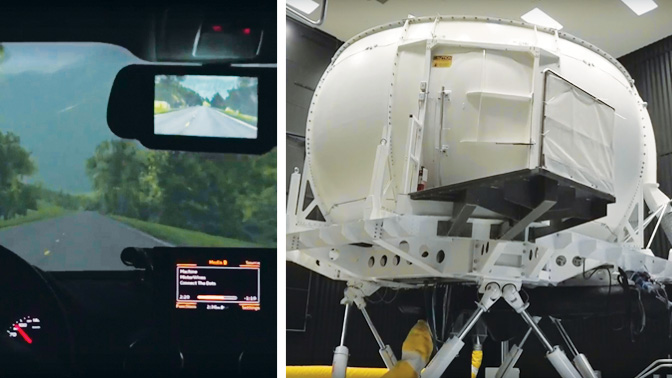
On October 12, 2017, researchers from the iDAPT labs at University Health Network’s Toronto Rehabilitation Institute launched DriverLab. This state-of-the-art virtual reality research simulator will enable researchers to study the impact of our health on driving performance, with an aim to increase driver safety in healthy older adults and people living with injury or illness.
DriverLab is the most advanced driving simulator in Canada and is unique in the world, in terms of the realistic experience it offers drivers. Using a mounted Audi A3, a 360-degree projector system, and a 7-degrees-of-freedom hydraulic motion platform, DriverLab immerses drivers in a high-resolution virtual environment, complete with surround sound. One-of-a-kind features include a weather simulator (to produce real rain droplets on the windshield) and a glare simulator (to recreate the harsh glare of oncoming headlights). Virtual scenery takes drivers into the city, country, and highway, during the day and at night.
DriverLab’s innovative technology comes at a time when vehicle collisions represent the number one cause of accidental death in Canada, and cost Canadians $62.7 billion per year. Global numbers are equally staggering: Every year, 1.24 million people around the world die in motor vehicle collisions and up to 50 million people suffer from disabling injuries due to motor vehicle collisions.
Key research goals that will be enabled by DriverLab include:
● Support independent aging by enabling the creation of customized driver licenses. Too many older adults are involved in collisions. DriverLab will help researchers to identify the most dangerous driving conditions, which could be used to inform the creation of customized licenses that would enable older adults to continue driving as long as safely possible.
● Study the effects of medication on driving performance. DriverLab will be used to determine the effect of various drugs, such as opioids, on driving performance. Watch a video of Dr. Andrea Furlan, Senior Scientist and pain specialist, explain how DriverLab will help us to understand how opioids affect a person’s ability to drive safely.
● Research the implications of drowsy driving. DriverLab will help address the associations between major sleep disorders (such as sleep apnea) and driving performance, and develop methods for preventing, detecting and diverting drowsy driving.
● Determine the full effects of automated driving systems. DriverLab will evaluate the impact of modern car safety systems, semi-autonomous vehicle features and driverless cars. Watch a video of Dr. Alex Mihailidis, Scientific Director of the AGE-WELL Network of Centres of Excellence (NCE), explain how DriverLab will support the research goals of AGE-WELL as it relates to transportation and new technologies for seniors.
● Reduce driving simulator sickness. DriverLab will help develop optimized driving simulation technologies, for testing centres to use for driver training and testing purposes.
To see DriverLab in action, and to learn about the above research goals, watch this video.
DriverLab was made possible through support from the Canadian Institutes of Health Research, the Canada Foundation for Innovation, the Government of Ontario, and Toronto Rehab Foundation. DriverLab was developed with the assistance of International Development of Technology B.V. (based in the Netherlands).
source: UHN.ca

Real rain helps to recreate common challenging conditions experienced in DriverLab. (Photo: UHN)




